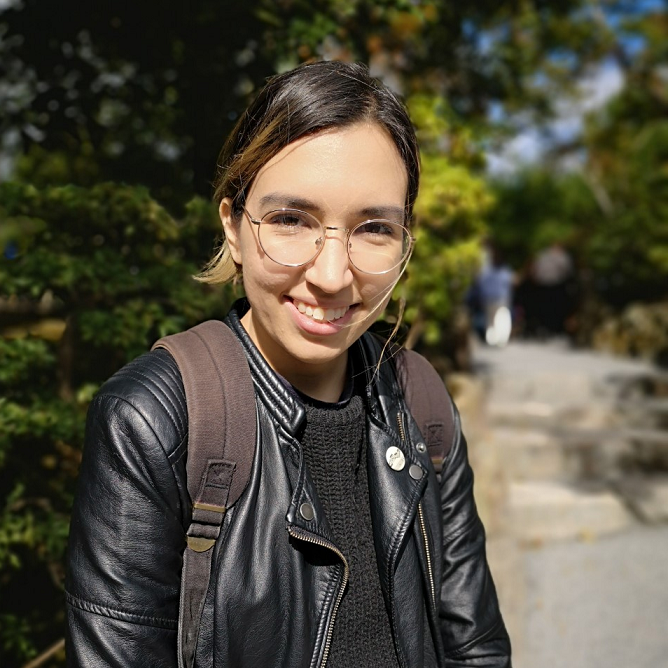 March 2021 Trainee Spotlight
March 2021 Trainee Spotlight
Name of Supervisor: Dr. Giamal Luheshi
Name of Co-Supervisors: Dr. Nicolas Cermakian & Dr. Marie-Claude Audet
Degree: Graduate Student – PhD
Year of Study: Year 5
Program of Study: Integrated Program in Neuroscience
Why did you choose to come to the Douglas?
I came to the Douglas to work with my graduate supervisor, Dr. Giamal Luheshi. In my undergrad, I had become interested in how stress affected the brain, the immune system, and the gut microbiome. My undergraduate supervisor at the time, Dr. Hymie Anisman, suggested that I pursue my graduate studies at McGill University with his friend and colleague, Giamal, who specialized in neuroinflammation and was interested in starting a gut microbiota project.
Giamal first supervised me when I came to the Douglas in May of 2016 for an undergraduate position (NSERC USRA) after which I stayed for graduate studies. I appreciated his creativity, passion, and the amount of freedom he gave his students to design and run their experiments. Giamal encouraged me to connect and collaborate with other research teams at the Douglas, apply for competitive funding, seek conference opportunities, and pursue professional development activities such as teaching and mental health advocacy.
Giamal passed away in November 2020, and I miss him. I miss his sense of humor, his compassion, the pastries he’d frequently bring to the student office, and his scientific zeal. I’m endlessly grateful to Dr. Nicolas Cermakian and other members of the Douglas community for being personally and professionally supportive following Giamal’s passing. We miss you, Giamal.
What did you do before coming to the Douglas?
My path to graduate studies was linear between my undergraduate degree in Neuroscience & Mental Health at Carleton University (Ottawa, Canada) and the Douglas. During my time at Carleton, I was a teaching assistant in the Department of Mathematics and Statistics and also engaged in mentoring and science communication initiatives in the Faculty of Science. Through generous funding from the Faculty of Science and NSERC, I spent three years as an undergraduate research trainee under the supervision of Dr. Hymie Anisman.
The highlight of my undergraduate research experience was the work that I did with Hymie and Dr. Marie-Claude Audet investigating the effects of social stress on gut microbiota. This work resulted in a publication, international conference presentations, and sparked my passion for microbiota research. Following her appointment as a professor in Nutrition at the University of Ottawa, Marie-Claude joined my graduate advisory committee and, in light of Giamal’s passing, has recently become my co-supervisor. In short, my undergraduate experience at Carleton introduced me to a community of scientists including Hymie, Marie-Claude, and many others who remain important pillars of support in my academic training.
Sell your research in 3 sentences
Stress, especially when it happens in early life, affects our mind, brain, and body in ways that predispose us to physical and psychiatric illness later in life. Recently, scientists have figured out that gut bacteria can modulate our responses to stressors, but we still don’t have a clear picture of how stress in early life shapes the bacterial communities present in our gut.
To study this, I use a mouse model of early life stress and assess changes in bacterial communities over time, how these changes might increase the risk of our brains and bodies getting sick, and whether these changes are different between male and female mice.
What excites you most about your research?
Between the pandemic and the collective work of multiple advocacy groups, our society is now more conscious than ever of the importance of physical and mental health. We understand that the same way that we all have physical health (even when we’re not sick), we all have mental health and, very often, one will influence the other. I’m excited about my research because it contributes to our understanding of what happens to our bodies and brains when we get sick. The better we understand this, the better we can treat it.
Gut microbes in particular are exciting to research right now not only because there’s a lot we don’t know but also because treatments targeting microbiota can be as simple as specific dietary changes or probiotic supplements. Promoting mental wellbeing usually involves several different interventions working together (such as psychotherapy, medicine, lifestyle changes, etc.). Although gut microbes don’t hold all the answers, I’m excited that nutritional interventions are now being included as a tool in promoting mental health.
If you could go back in time and give your “younger self” advice, what would you do differently?
I’d give myself a contradictory piece of advice: “it’s going to be very, very hard, and not in the ways that you expect. Nevertheless, don’t stress – you’ll find your way and figure it out. Give yourself more credit than you currently do.” In my case, I’d keep in mind that life happens during graduate studies. Not only is it a challenging time academically but is also very challenging personally. For me, that was largely the result of loneliness from living in a new city, losing the structure of undergraduate training, large bouts of imposter syndrome, and, lately, the disruptions of COVID-19 as well as the sudden death of my supervisor.
If I could do things differently, I would:
- Take more time to build a supportive network of colleagues and friends early in my degree
- Ask for help when I felt like I didn’t know what I was doing
- Talk with other students and academics about imposter syndrome
- Cultivate work-life balance as well as a fulfilling life outside of my academic pursuits
Do you have any additional experiences or advice that you’d like to share with prospective Douglas trainees?
Befriend other Douglas trainees. We’re spread out across a lot of buildings and floors but it’s worth going out of your way to meet them (i.e. Douglas academic events or departmental student associations). Douglas trainees are smart, friendly, helpful, and doing various types of research. We’re also going through the same stressors and victories as you are.
Shadow mental health professionals through the observership program. I had the privilege of shadowing practitioners treating depressive disorders, major psychosis, and eating disorders. My experiences provided me with valuable perspective into the lives of people living with the types of conditions that I hope preclinical research can help with.
Enjoy Verdun! In my early years, I dreaded my long commute to and from the lab. Moving to Verdun made me appreciate the grounds of the Douglas and the surrounding neighbourhoods. The Douglas is located on the river (where you can swim and fish during warm months), between a bunch of parks, and near local restaurants and small businesses including local cafes and used bookshops.
Make your graduate degree your own. Take these years to do research that excites you and to learn new things. Seek out ways to gain professional skills and experience that you wouldn’t have the opportunity for otherwise. I feel lucky to do research I’m passionate about, teach science to high school kids, liaise with federal mental health offices, volunteer with on-campus mental health initiatives, and mentor undergraduate students while having a guaranteed, stable, paid position for several years. Grad school is challenging – but it’s also full of potential. Enjoy it.


 March 2021 Trainee Spotlight
March 2021 Trainee Spotlight